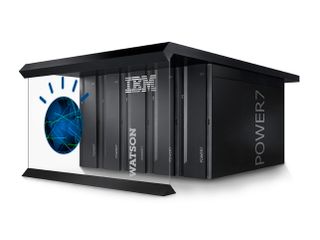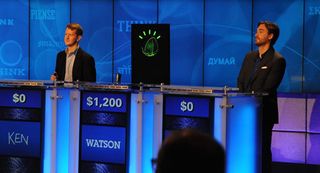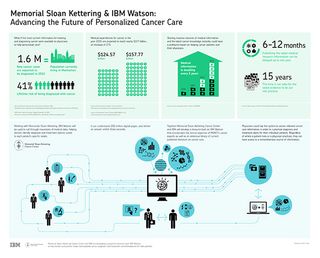
Computers were always meant to replicate the workings of the human mind, although when you look into this more closely, it becomes clear that human brains and computer processors function in very different ways. However, while we are a long way from true human-like artificial intelligence, there are some areas where computers have surpassed us already. It's around 17 years since IBM's Deep Blue showed its superiority over the greatest human chess player in the world at the time, Gary Kasparov. Throw in a liberal helping of cognitive science to the way we can interact with this kind of computing power, and you begin to have something with great potential to empower all manner of business and research activity.
The concept behind cognitive computing is essentially a system that's capable of learning through use. However, what makes the idea particularly powerful is the combination of this learning ability with big data sets. The human brain may still beat the computer for general-purpose thinking, but it doesn't have the same ability to store and retrieve huge amounts of information accurately. The problem is how to retrieve this data in a way that is useful in the real world, to solve human problems. A computer designed to win at chess like Deep Blue works in a relatively limited area of expertise, matching patterns across thousands of historical game strategies, with no real understanding what it is actually doing. But decoding a problem posed in natural human language and then providing relevant data is a much more complicated endeavour.
This is where IBM's Watson comes in. The project followed in the footsteps of Deep Blue, when IBM was looking for a new supercomputing Grand Challenge. In 2004, the idea of creating a system that could win in the TV quiz show Jeopardy! was suggested, and this became the new Grand Challenge project in 2005. The complexity of the problem was clearly much greater than chess, as the natural language questions in Jeopardy! would require interpretation in a way that chess piece positions do not, as well as the ability to respond in seconds. By 2010, the system's ability had progressed to a level where Watson could regularly beat human Jeopardy! contestants. In 2011, Watson won a practice round against legendary past winners Ken Jennings and Brad Rutter. It then went on to vanquish them in two televised matches. It also beat members of the US Congress in a further match that wasn't televised.

Although Watson's performance in Jeopardy! wasn't completely flawless, the fact that it could consistently beat the best players in this natural language-based game showed that its computing abilities had entered a new league compared to Deep Blue. The questions in Jeopardy! are not actually questions, but clues from which contestants must infer the original question to which they are the answer. So Watson not only had to understand the clue, but also derive a properly formed question out of this. Best of all, it could learn from its mistakes, and its skills improved throughout the run of Jeopardy! matches.
Making this incredible capability function behind the scenes was a massively parallel software architecture called DeepQA, running on 90 IBM Power 750 servers with a quartet of 3.5GHz eight-core processors each, for a total of 2,880 POWER7 cores, backed by 16TB of RAM. This hardware provides around 80 Teraflops of processing power, and would have placed well within the top 500 supercomputers in the world at the time of the Jeopardy! challenge. The DeepQA system is fed a broad domain of information, for example encyclopaedias, dictionaries, thesauri, news articles, literary works, and so on. These are collected as databases, taxonomies and ontologies. DeepQA then classifies the questions it is being asked, and figures out what kind of answer will be required. The system detects relations within the query, from which it can generate candidate answers.
A hardware setup of Watson's calibre would cost around $3 million, but companies wanting to take advantage of the capabilities won't need to shell out this level of capital. IBM is now offering Watson via the cloud. The IBM Watson Ecosystem Program has opened up the power of cognitive computing for developers to create their own Watson-powered applications. Allied to this is the Watson Content Store, which is a repository of general knowledge, data relating to specific industries, and expertise in particular subject areas. The final piece of the puzzle is the Watson Talent Hub, where developers can find the skills they need to create their own Watson software, such as linguistics, natural language processing, machine learning, user experience design, and analytics, should any of these not be available in-house.

In other words, companies can build their own Watson-powered solutions, with particular benefits for communications-based activities like customer service. Companies are already developing useful apps with Watson's cognitive computing abilities. For example, WellPoint, Inc has made effective use of Watson for aiding healthcare pre-approval decisions. The system was trained with 18,000 historical cases of insurance cover pre-approval for medical procedures. Nurses can then use the system to make faster decisions about treatment requests, which could save lives when treatments are time sensitive, and its abilities will only improve with usage. This case study explains what WellPoint has created in more detail.
Medical decision making is a key area where IBM Watson can provide enormous benefits. Memorial Sloan Kettering has been working with IBM to create a tool to help physicians choose the best treatment plan for cancer patients. Watson assists with analysing the massive amount of data that is collected, and puts expert-level information at the fingertips of every doctor. Memorial Sloan Kettering has been teaching Watson with past oncology history. The system has learnt from past cases, and can suggest treatments that fit the patient. The video below has more information on the programme.
In a different business area, Fluid, Inc is creating an Expert Personal Shopper to humanise the online retail experience. The aim is to produce natural dialogue-driven assistance for customers purchasing online, making this more like the rapport an in-store representative builds with a customer in just a short conversation. Using product information, customer loyalty data, sales history, user reviews, blogs, magazines and travel documents as its seed data, IBM's Watson smooths the complication of online shopping, allowing customers to ask more natural questions, without having to do all the research and find all the answers themselves. For more details on Fluid's use of Watson, read the case study here.
These are just a few of a growing range of examples of how IBM Watson is enhancing business practice. Scientific research and finance are also proving to be areas that can benefit greatly from the technology. But any activity where huge amounts of data must be interrogated using natural language, to find answers beyond what human memory can achieve, has the potential to be dramatically improved by IBM Watson. Cognitive computing promises a new era of information technology, which is only just starting to be realised. Come and see what IBM Watson could do your for your business.
Get the ITPro. daily newsletter
Receive our latest news, industry updates, featured resources and more. Sign up today to receive our FREE report on AI cyber crime & security - newly updated for 2024.
ITPro is a global business technology website providing the latest news, analysis, and business insight for IT decision-makers. Whether it's cyber security, cloud computing, IT infrastructure, or business strategy, we aim to equip leaders with the data they need to make informed IT investments.
For regular updates delivered to your inbox and social feeds, be sure to sign up to our daily newsletter and follow on us LinkedIn and Twitter.





